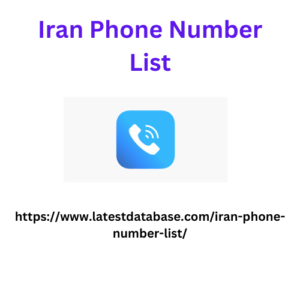In the digital age, communication has evolved dramatically, and email remains a cornerstone of professional and personal interactions. Despite the rise of instant messaging and social media, email continues to be a preferred method for formal communication. One essential aspect of crafting a well-received email is how you conclude it, and nothing leaves a lasting positive impression quite like a heartfelt “thank you.” This article explores the significance of ending emails with a “thank you,” provides practical tips, and offers examples to help you master this courteous practice.
Why Ending with “Thank You” Matters
Establishing a Positive Tone
Ending your email with a “thank you” sets a Iran Phone Number List positive tone and reinforces a sense of gratitude. This simple act of appreciation can make the recipient feel valued and respected. Whether you’re thanking them for their time, assistance, or consideration, expressing gratitude can significantly impact how your message is received.
Fostering Stronger Relationships
Building and maintaining strong Afghanistan Phone Number List relationships, especially in professional settings, requires consistent and thoughtful communication. Concluding your email with a “thank you” can help in nurturing these relationships by showing that you recognize and appreciate the efforts of others. Over time, this can lead to stronger connections and better collaboration.
Enhancing Professionalism
A well-structured email that ends with a “thank you” reflects professionalism and attention to detail. It demonstrates that you are considerate and mindful of the recipient’s time and efforts. This can be particularly important in job applications, client communications, and other professional interactions where first impressions matter.
How to Effectively Use “Thank You” at the End of an Email
Be Specific
When expressing gratitude, be specific about what you are thanking the recipient for. This not only shows that you are paying attention but also makes your appreciation more meaningful. For example, instead of a generic “thank you,” you could say, “Thank you for reviewing my proposal and providing valuable feedback.”
Match the Tone of Your Email
The tone of your “thank you” should align with the overall tone of your email. If the email is formal, maintain that level of formality in your closing. Conversely, if the email is more casual, a less formal “thank you” may be appropriate. For instance, in a formal email, you might write, “Thank you for your consideration.” In a more casual context, “Thanks for your help!” could be more suitable.
Consider the Context
Different situations call for different expressions of gratitude. For example, in a professional setting, you might end an email with, “Thank you for your assistance in this matter.” In a personal email, you could say, “Thank you for always being there for me.” Tailoring your “thank you” to the context ensures it resonates with the recipient.
Examples of Ending an Email with “Thank You”
Professional Setting
- Job Application
- “Thank you for considering my application. I look forward to the possibility of working with your esteemed company.”
- Client Communication
- “Thank you for your continued trust and support. Please feel free to reach out if you have any further questions.”
- Project Collaboration
- “Thank you for your input on the project. Your expertise is invaluable to our success.”
Personal Setting
- Friendly Correspondence
- “Thanks for catching up with me. It was great to hear from you!”
- Favor or Help
- “Thank you for helping me move last weekend. Your assistance made a big difference!”
- Invitation Acceptance
- “Thank you for inviting me to your event. I’m looking forward to it!”
Conclusion
In conclusion, ending your emails with a “thank you” is a powerful way to convey appreciation, enhance professionalism, and build stronger relationships. By being specific, matching the tone of your email, and considering the context, you can make your “thank you” more impactful. Whether in professional or personal settings, a thoughtful “thank you” can leave a lasting positive impression, fostering goodwill and better communication.
Next time you draft an email, remember the importance of that final note of gratitude. A simple “thank you” can go a long way in ensuring your message is well-received and appreciated.


